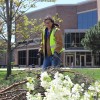

How our farming system actually hurts farming
Intense rainfall, warmer summer evenings, and wetter soil make growing food more unpredictable.
Agriculture is a vital industry that we all rely on — after all, it’s what feeds us. But in 2020, the industry was responsible for 11.2% of U.S. greenhouse gas emissions, which contributes to a warming planet. This, in turn, creates challenges for growers whose seasons are impacted by intense rainfall and warmer night time temperatures.
Reset learns more about how the farming methods we rely on is actually hurting our ability to grow food.
GUESTS: Trent Ford, Illinois state climatologist
Liz Moran Stelk, executive director Illinois Stewardship Alliance
Andy Hazzard, founder of Hazzard Free Grain farm in Pecatonica, Ill.
More From
Reset with Sasha-Ann Simons


How our farming system actually hurts farming
Intense rainfall, warmer summer evenings, and wetter soil make growing food more unpredictable.
Agriculture is a vital industry that we all rely on — after all, it’s what feeds us. But in 2020, the industry was responsible for 11.2% of U.S. greenhouse gas emissions, which contributes to a warming planet. This, in turn, creates challenges for growers whose seasons are impacted by intense rainfall and warmer night time temperatures.
Reset learns more about how the farming methods we rely on is actually hurting our ability to grow food.
GUESTS: Trent Ford, Illinois state climatologist
Liz Moran Stelk, executive director Illinois Stewardship Alliance
Andy Hazzard, founder of Hazzard Free Grain farm in Pecatonica, Ill.










